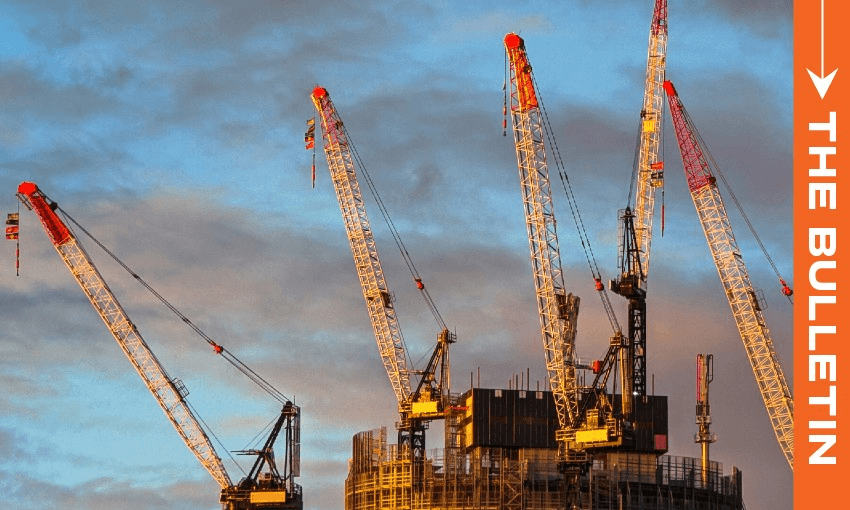But, asks Stewart Sowman-Lund in this extract from The Bulletin, can Winston Peters win his cabinet colleagues over with his ‘future fund’?
To receive The Bulletin in full each weekday, sign up here.
The push for foreign investment
We talked briefly yesterday about Winston Peters’ plans for a $100bn “future fund” – a ring-fenced infrastructure initiative to be used for projects “in our national interest” – which it appears he intends to campaign on at the next election rather. It’s a bold move, and one that appears to show a softening stance on his party’s view on seeking foreign investment.
The bigger picture is that while Peters is arguing for his long term policy, the government he’s part of is making smaller waves in the same area. The prime minister, as we’ll talk about below, is strongly behind his government’s plans for a new National Infrastructure Agency. And in an announcement made during the typical unfriendly news slot of Saturday morning, associate finance minister David Seymour revealed that foreign investment rules will be loosened, as explained by The Post’s Tom Pullar-Strecker. The move will effectively flip the existing burden of proof that requires overseas investors to prove their investment will benefit the country, with Seymour saying “the new starting point is that investment can proceed unless there is an identified risk to New Zealand’s interests”.
It’s no surprise
The weekend’s announcement had been foreshadowed for some time. Back in May, the OECD noted our restrictive foreign investment rules as barriers to increasing productivity, ranking New Zealand at 38th (out of 38 countries) when it came to openness for investment. At the time, reported The Post, David Seymour indicated that the government had gone as far as it could under the existing legal framework in allowing for more investment and signalled that he was drafting up new legislation. “I’m working as rapidly as possible to send the message to the world that New Zealand actually wants people to come in and invest here,” he said. What we have now is just an initial outline of where the government intends to go, and further detail will likely emerge next year.
Beyond a global assessment of our situation, it has been widely observed that New Zealand has an infrastructure deficit. In a statement, Infrastructure NZ welcomed the shift in our overseas investment rules, saying it was necessary to “supercharge New Zealand’s infrastructure uplift”.
Coalition in alignment (almost)
With all three parties pushing for broadly the same thing, the invitation to foreign investors appears wide open. Writing for BusinessDesk (paywalled), Pattrick Smellie said the significance of Winston Peters’ new proposal, which would involve changes to the tax system to attract foreign investment, was less about what he said and more that he said anything at all. “Hostility to foreign investment, quite simply, has always been part of NZ First’s DNA,” wrote Smellie. As he notes, while the announcements by Peters and Seymour were not directly connected, “the coalition’s message is undoubtedly aligned”.
In a recent interview with Smellie’s colleague Dileepa Fonseka (paywalled), Christopher Luxon said that New Zealand needed to make it easier for foreigners to invest, contrasting us with one of his favourite small nations. “At the moment we’ve sort of got this ‘you’re lucky to invest in New Zealand’ and yet in Ireland it’s ‘thank you for coming all this way to spend your money with us’,” the prime minister told BusinessDesk.
In all likelihood, Peters will be taking his policy with him into the 2026 election campaign, though RNZ reported he was confident of getting buy in from his coalition partners. He told Newstalk ZB’s Mike Hosking he hadn’t seen the government’s own announcement on Saturday and “couldn’t quite follow” what Seymour had said. At his weekly post-cabinet press conference yesterday evening, Christopher Luxon confirmed Peters’ future fund idea had not been discussed and parties were “free” to take their own ideas to the next election. However, on the general principle of foreign investment, Luxon reiterated: “I sit down with investors regularly offshore and say what’s the ‘good the bad and the ugly’ of investing in New Zealand, and the messages are pretty simple: it’s too hard to get anything done [and] it takes too long…
A softening on foreign home ownership?
Meanwhile, in that same interview with Mike Hosking, Peters appeared willing to loosen his stance on foreign ownership of property – something that he was reportedly unprepared to budge on during coalition talks. But it would take more than someone with a “lousy $20m” to make that happens, Peters told Hosking, and wasn’t about allowing people to buy up and then abandon homes in “leafy suburbs” like Remuera. “If you’ve got the right investor here, who’s going to argue about them buying a home,” said Peters. In an interview with Bloomberg earlier in the year, the deputy prime minister similarly suggested that he would be open to relaxing the rules for ultra-wealthy foreigners that were prepared to invest more broadly in the economy.
Meanwhile, we have a new political poll that could fuel Peters and his policy push. Last night’s TVNZ poll showed steady support for the coalition, though New Zealand First was heading dangerously close to the 5% threshold at which they would be turfed back out of parliament. Writing for the Herald, Thomas Coughlan suggested that was the figure that would worry the government the most – “a plausible worst-case scenario for the coalition would be for NZ First to slip ever so slightly, crashing out of parliament and taking 4% of the vote with it”.


